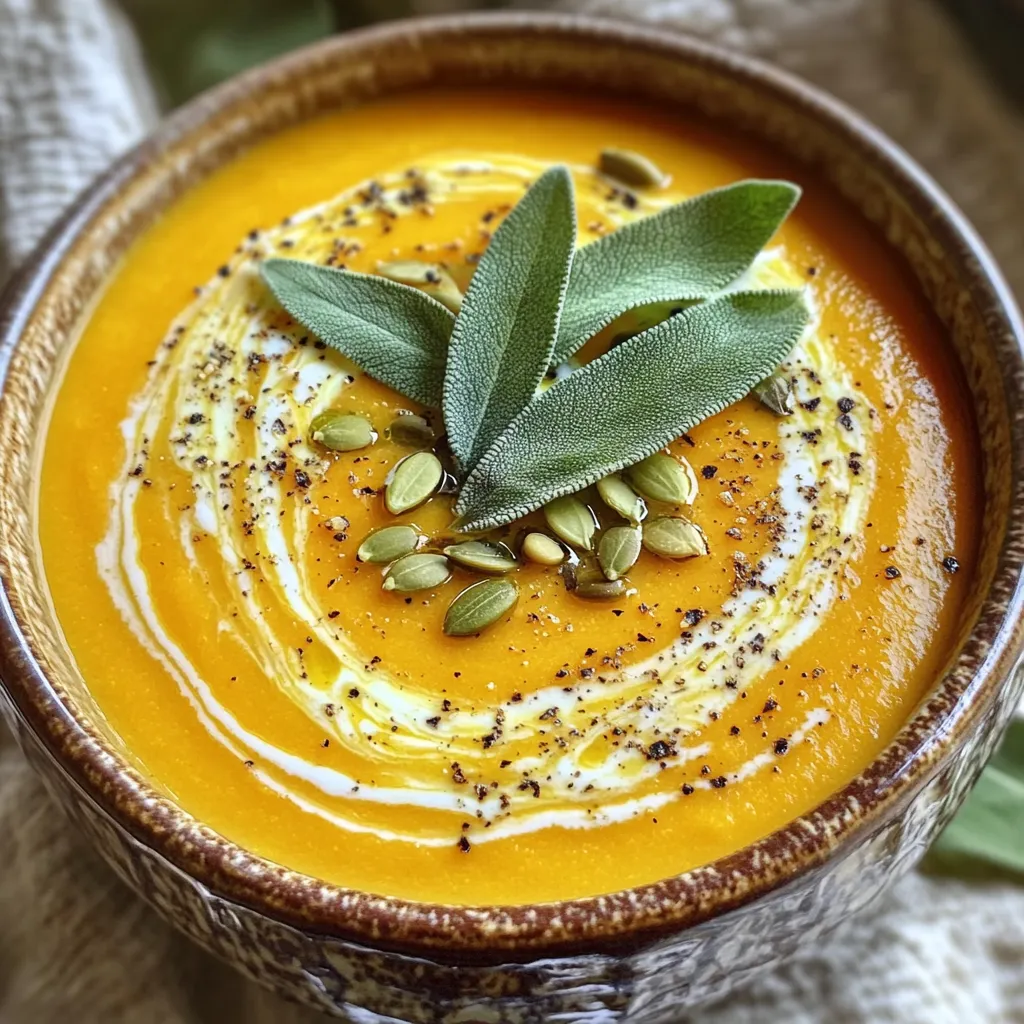Butternut Squash Bisque with Crispy Sage Delight

Looking for a warm and cozy dish to impress your friends? My Butternut Squash Bisque with Crispy Sage is just what you need! This creamy soup combines sweet squash and savory sage for a delightful flavor. Follow my easy recipe to make this comforting classic, perfect for chilly days. Ready to dive in? Let’s discover how to create this tasty bisque together!
Ingredients
Main Ingredients for Butternut Squash Bisque
To make a tasty butternut squash bisque, gather these main ingredients:
– 1 medium butternut squash, peeled and cubed
– 1 medium onion, diced
– 2 cloves garlic, minced
– 4 cups vegetable broth
– 1 can (13.5 oz) coconut milk
These ingredients create a creamy and rich base for your bisque. The butternut squash gives a sweet and nutty flavor, while the coconut milk adds creaminess.
Seasonings and Aromatics
Next, add these seasonings and aromatics for extra flavor:
– 1 teaspoon ground nutmeg
– 1 teaspoon ground cinnamon
– 2 tablespoons olive oil
– Salt and pepper to taste
– 10 fresh sage leaves
– 1 tablespoon lemon juice
Nutmeg and cinnamon bring warmth to the dish. Sage adds a lovely herbal note, and lemon juice brightens up the flavors.
Optional Garnishes
For a final touch, consider these optional garnishes:
– Pumpkin seeds
Sprinkling pumpkin seeds on top adds a nice crunch. It also makes your bisque look more inviting. Enjoy creating this delightful dish!
Step-by-Step Instructions
Preparation of the Base
Start by heating two tablespoons of olive oil in a large pot over medium heat. When the oil shimmers, add one medium diced onion. Sauté it for about five minutes until it turns soft and clear. Next, add two minced garlic cloves. Cook for one more minute. Make sure not to burn the garlic; it can turn bitter.
Cooking the Squash and Broth
Now, add one medium butternut squash, peeled and cubed, into the pot. Pour in four cups of vegetable broth. Sprinkle in one teaspoon each of ground nutmeg and cinnamon. Turn up the heat until the mix boils. Once boiling, lower the heat. Let it simmer for 20-25 minutes, or until the squash is tender enough to pierce with a fork.
Blending and Finishing the Bisque
After the squash is soft, take the pot off the heat. Use an immersion blender to blend the soup until it’s smooth. If you don’t have one, carefully transfer the soup in batches to a blender. Blend until smooth, then return it to the pot. Heat the bisque again and stir in one can of coconut milk and one tablespoon of lemon juice. Season with salt and pepper to taste. Warm it through for another five minutes.
Making Crispy Sage
To make the crispy sage, heat one teaspoon of olive oil in a small pan over medium heat. Add ten fresh sage leaves and cook for about one to two minutes. The leaves should turn crispy and bright green. Move them to a plate lined with paper towels to drain off excess oil.
Now your bisque is ready to be served! Ladle it into bowls and top with crispy sage leaves. For extra crunch, you can sprinkle some pumpkin seeds on top. Enjoy this warm and creamy delight!
Tips & Tricks
Tips for Creamy Texture
For a rich and creamy bisque, use coconut milk. This adds a lovely smoothness. Blend the soup until it is very smooth. If you want it silkier, strain it through a fine mesh. Adding nutmeg and cinnamon gives warmth and depth.
Common Mistakes to Avoid
One mistake is not cooking the squash long enough. Always check if it’s fork-tender before blending. Another error is overcooking the garlic. It should smell good, not burn. Season with salt and pepper at the end for best flavor.
Recommended Kitchen Tools
Use a large pot for cooking the soup. A good immersion blender makes blending easy. If you don’t have one, a standard blender works too. You’ll also need a small pan for the crispy sage. A sharp knife and cutting board are must-haves for prep.

Variations
Alternative Ingredients for Flavor
You can mix it up with different flavors. Try adding a hint of ginger for warmth. For more depth, consider using apple or pear. You might also swap in different squashes, like acorn or kabocha. Each choice changes the taste while keeping it cozy and sweet.
Vegan Adjustments and Substitutes
This bisque is easy to make vegan. Use vegetable broth instead of chicken broth. Coconut milk is already vegan, so you’re set there. For added creaminess, try cashew cream or almond milk. You can also add nutritional yeast for a cheesy flavor without dairy.
Seasonal Variations
In fall, use fresh herbs like thyme or rosemary for extra flavor. In spring, add fresh peas for a pop of color and sweetness. You can even toss in roasted carrots for a touch of earthiness. Each season brings new tastes, making this bisque fun to adapt.
Storage Info
Best Practices for Storing Bisque
To keep your butternut squash bisque fresh, store it in airtight containers. Cool the bisque to room temperature before sealing it. This helps prevent condensation, which can make the soup watery. It stays good in the fridge for about three to four days.
How to Reheat Leftovers
When you’re ready to enjoy your leftovers, pour the bisque into a pot. Heat it over medium-low heat, stirring often. This helps it warm evenly. You can also use the microwave, but stir it halfway through. Heat until it reaches your desired temperature.
Freezing and Thawing Instructions
If you want to save some bisque for later, freezing is a great option. Pour the cooled bisque into freezer-safe bags or containers. Leave some space at the top for expansion. It can stay in the freezer for up to three months. To thaw, move it to the fridge overnight or use the defrost setting on your microwave. Reheat as mentioned above before serving.
FAQs
What is the origin of Butternut Squash Bisque?
Butternut squash bisque comes from French cuisine. Bisque is a creamy soup, often made with seafood. This recipe uses butternut squash as the main star. It has roots in autumn harvest traditions, celebrating fall flavors. Farmers would often use squash in soups, showing off their crops.
Can I make this recipe in advance?
Yes, you can make butternut squash bisque ahead of time. The flavors deepen as it sits. Store it in an airtight container in the fridge for up to three days. Reheat gently on the stove before serving. This makes it perfect for busy weeknights or gatherings.
How can I make it spicier?
To spice up your bisque, add a pinch of cayenne pepper. You can also use crushed red pepper flakes. For a fresh kick, try adding diced jalapeño peppers. Stir in these spices while cooking to let the heat bloom. Adjust to your taste, and enjoy the warmth!
What to serve with Butternut Squash Bisque?
Pair your bisque with crusty bread or a fresh salad. A side of grilled cheese also complements the soup well. For a touch of elegance, serve with a light, crisp white wine. Don’t forget to sprinkle pumpkin seeds on top for crunch!
This article covered how to make butternut squash bisque. You learned about the main ingredients, seasonings, and optional garnishes. I shared step-by-step instructions for preparation, cooking, blending, and finishing the bisque. Tips for a creamy texture and common mistakes were also discussed. We explored variations, storage tips, and answered common questions.
Now you have the tools to create a delicious bisque at home. Enjoy your cooking!


![To make creamy garlic mushroom pasta, gather these items: - 12 oz (340g) fettuccine pasta - 2 tablespoons extra virgin olive oil - 3 cups fresh button mushrooms, sliced - 4 cloves garlic, finely minced - 1 cup heavy cream - 1 cup low-sodium vegetable broth - 1 teaspoon dried thyme - ½ teaspoon crushed red pepper flakes (optional) - Sea salt to taste - Freshly ground black pepper to taste - ½ cup freshly grated parmesan cheese - Fresh parsley, finely chopped (for garnish) You can swap some ingredients if needed: - Use penne or spaghetti instead of fettuccine. - Replace heavy cream with coconut cream for a dairy-free option. - Try shiitake or cremini mushrooms for a different flavor. - Use chicken broth in place of vegetable broth for a richer taste. - Nutritional yeast can replace parmesan cheese for a vegan dish. This creamy garlic mushroom pasta is rich and filling. Here’s a quick look at its nutrition: - Calories: About 600 per serving - Protein: Approximately 15g per serving - Carbs: Around 60g per serving - Fat: Roughly 30g per serving - Fiber: About 3g per serving This dish offers a good balance of flavors and nutrients. You can enjoy a hearty meal without guilt. For the full recipe, check out the cooking instructions above! Start by boiling a large pot of water. Make sure to add a good amount of salt; this helps the pasta taste better. Once the water is boiling, add 12 oz of fettuccine pasta. Cook according to the package directions until it is al dente. This usually takes about 8-10 minutes. When it’s done, drain the pasta but save about ½ cup of the water. Set the pasta aside. Next, grab a large skillet and heat 2 tablespoons of extra virgin olive oil over medium heat. When the oil is hot, add 3 cups of sliced button mushrooms. Sauté these for about 5-7 minutes. Stir them often until they turn golden brown and tender. Once they look good, add 4 cloves of finely minced garlic. Sauté for another 1-2 minutes. Be careful not to burn the garlic; it can get bitter. Now, it’s time to make the sauce. Pour in 1 cup of low-sodium vegetable broth and stir it into the mushrooms. Slowly add 1 cup of heavy cream while stirring. Bring the mixture to a gentle simmer. Then, season the sauce with 1 teaspoon of dried thyme, sea salt, and freshly ground black pepper. You can also add ½ teaspoon of crushed red pepper flakes if you want some heat. Let it simmer for about 5 minutes until it thickens a little. Stir in ½ cup of freshly grated parmesan cheese next. Let it melt into the sauce. Then, add the cooked fettuccine to the skillet. Toss gently to coat the pasta with the creamy sauce. If the sauce is too thick, mix in some reserved pasta water until it’s just right for you. Taste the dish and adjust the salt and pepper as needed. Serve the pasta right away. Garnish with fresh parsley and extra parmesan if you like. Enjoy your delicious creamy garlic mushroom pasta! For the full recipe, check [Full Recipe]. To get a smooth sauce, keep the heat low. When you add the cream, stir gently. This helps avoid lumps. If your sauce gets too thick, use reserved pasta water. This starchy water adds creaminess. Aim for a silky feel that clings to the pasta. One common mistake is cooking garlic too long. Garlic burns quickly and turns bitter. Add it only after mushrooms are golden. Another mistake is not seasoning enough. Taste your sauce before serving. Adjust salt and pepper to enhance flavor. Lastly, don't rush the simmering process. A good simmer allows flavors to meld. Add fresh herbs like basil or oregano for a pop of flavor. You can also sprinkle fresh thyme on top before serving. If you enjoy a hint of heat, try adding fresh chili or more red pepper flakes. These little tweaks can make a big difference in taste. {{image_4}} You can easily make this dish vegetarian or vegan. For a vegetarian twist, just skip the chicken or shrimp. Use vegetable broth for a rich flavor. To make it vegan, swap heavy cream for coconut cream or a plant-based cream. Nutritional yeast can replace parmesan for a cheesy taste without dairy. You can also add extra veggies like spinach or peas for more color and nutrients. Want to add protein? You can mix in cooked chicken or shrimp. For chicken, sauté bite-sized pieces until golden and cooked through. For shrimp, add them when you sauté the garlic to cook them just right. Both options add heartiness and flavor. You can even use cooked sausage or bacon for a different taste. If you're looking for a lighter pasta dish, consider some simple swaps. Use whole wheat fettuccine for more fiber. Swap heavy cream for Greek yogurt or a light cream. You can also cut down on cheese or use a lower-fat version. Adding more veggies, like zucchini or bell peppers, can keep it light while still being filling. These changes can help you enjoy a creamy dish without the extra calories. For the full recipe, check out Creamy Garlic Mushroom Fettuccine 🧄. To keep your creamy garlic mushroom pasta fresh, first let it cool. Then, place the leftovers in an airtight container. Store it in your fridge. It will stay good for up to three days. Make sure to label the container with the date. This helps you track how long it has been stored. When you're ready to enjoy the pasta again, reheat it gently. You can use the stove or microwave. If using the stove, add a splash of water or broth to the pan. This keeps the pasta creamy. Heat over low to medium heat, stirring often. If you prefer the microwave, cover the bowl with a lid or wrap. Heat in short bursts, stirring in between. If you want to store the pasta for longer, freezing is a great option. Place the cooled pasta in a freezer-safe container. You can also use freezer bags. Remove as much air as possible before sealing. This keeps the pasta safe from freezer burn. It can last up to three months in the freezer. When you’re ready to eat, thaw it overnight in the fridge before reheating. For the best taste and texture, avoid freezing the pasta with the sauce. Instead, freeze the sauce and pasta separately. This way, they stay fresh and flavorful. For the full recipe, check out the detailed steps above! Yes, you can use different pasta shapes. This recipe works well with penne, linguine, or spaghetti. Each type offers a unique texture. Just be sure to adjust the cooking time based on the pasta you choose. Absolutely! You can use gluten-free pasta made from rice or another grain. These options cook similarly to regular pasta. Make sure to check the package for cooking times. To add heat, sprinkle in more crushed red pepper flakes. You can also use spicy sausage or add a dash of hot sauce. Start with small amounts, then taste as you go. This creamy garlic mushroom pasta pairs well with a simple green salad. Garlic bread is also a great choice. For something light, serve steamed broccoli or sautéed spinach alongside. For the complete recipe, check [Full Recipe]. This blog post covered key ingredients, step-by-step cooking, and helpful tips for your dish. You learned about ingredient substitutions and how to store leftovers. Variations allow you to customize for any diet or taste preference. Remember to avoid common mistakes for the best results. With these guidelines, you can create a delightful pasta dish that suits your needs. Enjoy experimenting and making it your own!](https://blissfulmeal.com/wp-content/uploads/2025/06/c4372ee0-3215-43bb-b5c3-48cd8b91c63f-768x768.webp)




![To make Honey Garlic Glazed Carrots, you will need the following ingredients: - 1 lb baby carrots (or regular carrots, peeled and sliced evenly) - 3 tablespoons honey - 2 tablespoons extra virgin olive oil - 3 cloves garlic, finely minced - 1 tablespoon low-sodium soy sauce - 1 teaspoon fresh ginger, finely grated - Sea salt and freshly cracked black pepper, to taste - Fresh parsley, finely chopped (for garnish) These simple ingredients come together to create a sweet and savory glaze. The honey adds a touch of sweetness, while garlic and ginger give it depth. Using fresh ingredients makes a big difference in flavor. You can find the full recipe for these delicious carrots in the main article. Enjoy making this vibrant side dish that pairs perfectly with many meals! - First, wash the baby carrots well. - If using regular carrots, peel and slice them into even pieces. - In a large mixing bowl, mix together honey, olive oil, minced garlic, soy sauce, and grated ginger. - Whisk these ingredients until smooth and well combined. - Add the carrots to the bowl and coat them with the honey-garlic glaze. - Preheat your oven to 400°F (200°C). - Line a baking sheet with parchment paper for easy cleanup. - Spread the coated carrots in a single layer on the baking sheet. - Pour any leftover glaze over the carrots. - Place the baking sheet in the oven and roast for 25-30 minutes. - Toss the carrots halfway through to ensure even cooking. - After roasting, remove the carrots from the oven. - Season them with sea salt and freshly cracked black pepper. - Gently toss to mix the seasoning well. - Transfer the glazed carrots to a serving dish. - Garnish with finely chopped fresh parsley for a vibrant look. You can find the Full Recipe for these delicious honey garlic glazed carrots above. Enjoy every bite! To get the best caramelization, space the carrots well on the baking sheet. They need room to roast. If they are too close, they steam instead of roast. Toss them midway through cooking. This helps them brown evenly on all sides. You can add more flavor with spices or herbs. Try a pinch of cumin or thyme for a fresh twist. If you want it sweeter, add more honey. For a bit of heat, a dash of red pepper flakes works great too. Adjust the sweetness to what you like best. Use a heavy-duty baking sheet for even cooking. A rimmed sheet helps catch any glaze that may run off. A sturdy spatula is great for mixing the carrots with the glaze. These tools will make your cooking easier and more fun. For the full recipe, check out the Sweet & Sticky Honey Garlic Carrots. {{image_4}} Switching up ingredients can make this dish even more exciting. You can try different sweeteners like maple syrup or agave nectar. Each will give a unique taste. Citrus zest, like orange or lemon, adds a bright note. Just a little zest can lift the flavor and make your dish pop. You have choices for how to cook these carrots. Stovetop sautéing gives a quick, tasty option. Just cook them in a pan with the glaze until tender. Oven roasting works well for a sweet, caramelized finish. If you want a smoky flavor, grilling is perfect. Just toss them on the grill after glazing. These honey garlic glazed carrots pair well with many main dishes. They go great with roasted chicken or grilled fish. If you want something lighter, toss them in a salad or a grain bowl. Their sweet and savory taste adds a fun twist to any meal. Want the full recipe? Check out the [Full Recipe]. To keep your honey garlic glazed carrots fresh, store them in the fridge. Use an airtight container. This helps keep out moisture and air, which can spoil the dish. They stay good for about 3–4 days. When you are ready to eat them again, simply reheat in the microwave. Heat them for 1–2 minutes, stirring halfway to ensure even warmth. You can also warm them in a pan over low heat. Just add a little water to prevent sticking. If you want to save some for later, freezing is a great choice. Start by letting the carrots cool completely. Then, place them in a freezer-safe bag or container. Squeeze out as much air as possible to avoid freezer burn. They can last up to 3 months in the freezer. When you want to enjoy them, thaw in the fridge overnight. For quick thawing, you can use the microwave on the defrost setting. Once thawed, reheat them as you would with fresh leftovers. To make this dish vegan, you can substitute honey with maple syrup or agave nectar. These alternatives will still give you a sweet flavor. You can also use coconut aminos instead of soy sauce for a soy-free version. Just mix the new ingredients the same way as the original recipe. This keeps the taste delicious while making it plant-based. You can use frozen carrots, but the texture may change. Frozen carrots often turn softer when cooked. This means they might not get as tender as fresh carrots. You will also need to adjust the cooking time. Start with 15 to 20 minutes in the oven, checking for tenderness along the way. These carrots pair well with many dishes. You can serve them alongside grilled chicken or fish for a healthy meal. They also go great with rice or quinoa for a complete vegetarian dinner. Adding them to a salad can bring a nice sweetness too. This makes for a colorful and tasty plate. Check the Full Recipe for more details on making these tasty carrots! In this post, I shared tips for making Honey Garlic Glazed Carrots. We covered the key ingredients and step-by-step instructions for roasting. I also offered tips for perfect caramelization and flavor enhancement. Whether using stovetop methods or even grilling, you have many options. Remember to store leftovers properly for later enjoyment. With these ideas, you can make a tasty side dish that pairs well with many meals. Try it out and enjoy the boost of flavor in your cooking!](https://blissfulmeal.com/wp-content/uploads/2025/06/4c933864-ba3c-4acc-b8ae-e90987d0e241-768x768.webp)